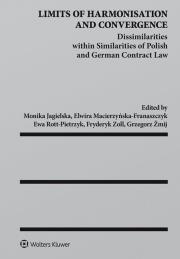
Limits of Harmonisation and Convergence
Wydawca:
Wolters Kluwer
wysyłka: niedostępny
ISBN:
9788381242981
EAN:
9788381242981
oprawa:
Twarda
podtytuł:
Dissimilarities withinin Similarities of Polish and German Contract Law
format:
14.5x21.0cm
język:
angielski
Seria:
MONOGRAFIE
liczba stron:
432
rok wydania:
2018
(0) Sprawdź recenzje
28% rabatu
143,26 zł
Cena detaliczna:
199,00 zł
dodaj do schowka
koszty dostawy
Najniższa cena z ostatnich 30 dni: 143,66 zł
Opis produktuZasady bezpieczeństwa
In 2015 the European legislator stopped the legislative process concerning the Common European Sales Law. The fully-fledged autonomous European system of contract law met with a mixed reception among the EU Member States. The European Union decided to continue the process of harmonization of the laws by spot legislation complementing the traditional national systems. Despite the progressive development of the acquis communautaire, there is still the need for further harmonization of the law of contracts.
The differences between national systems of contract law give rise to numerous impediments in the internal market. Even seemingly similar laws result in different interpretations and solutions in particular cases. The identical legal rules are not a guarantee of its exact understanding in different states. This is clearly visible even in the case of neighbouring countries with a similar legal tradition, like Poland and Germany. Despite the fact that the German law has often inspired the Polish doctrine and case law and the German method of legal reasoning has impacted the Polish jurisprudence, these two systems are in many aspects quite different from each other.
The existing dissimilarity and at the same time proximity of Polish and German contract law make a fascinating field for legal analysis. In the book we examine Polish and German law from the perspective of case law. The core of the analysis are German cases concerning various legal issues resulting from the lack of conformity in the contract of sale, specific work contract and donation contract. The main findings of the German cases are subsequently analysed with reference to the substantive Polish law. The adopted method of analysis makes this book the unique and inspiring collection of comparative arguments and reflections on law and methods of legal reasoning adopted in Germany and Poland.
The book is recommended to academics and legal practitioners in the field of contract law. It is also invaluable for Polish and German judges as a source of comparative argumentation derived from German and Polish law.
W 2015 r. ustawodawca europejski wstrzymał prace legislacyjne nad Wspólnym Europejskim Prawem Sprzedaży (CESL). Kompleksowy i autonomiczny system prawa umów spotkał się z mieszanym przyjęciem wśród państw członkowskich Unii Europejskiej. Unia Europejska postanowiła kontynuować proces harmonizacji prawa przez punktową legislację, uzupełniającą tradycyjne systemy krajowe. Mimo ciągłego rozwoju acquis communautaire potrzeba dalszej harmonizacji prawa kontraktów jednak nadal istnieje.
Różnice między krajowymi systemami prawa umów powodują wiele utrudnień na rynku wewnętrznym. Z pozoru podobne przepisy prawa podlegają odmiennej wykładni i prowadzą do odmiennych rozstrzygnięć w konkretnej sprawie. Nawet identyczne przepisy prawne nie dają gwarancji ich identycznego rozumienia w poszczególnych państwach. Jest to wyraźnie dostrzegalne także w sąsiednich państwach o podobnej tradycji prawnej, takich jak Polska i Niemcy. Mimo że prawo niemieckie stanowiło często inspirację dla polskiej doktryny i judykatury, a niemiecka metoda analizy prawniczej miała wpływ na polską jurysprudencję, te dwa systemy prawne różnią się pod wieloma względami.
Istniejące odmienności oraz podobieństwa polskiego i niemieckiego prawa kontraktów tworzą interesujący obszar analizy prawniczej. W książce poddajemy badaniu prawo polskie i niemieckie z perspektywy orzecznictwa. Główny obszar badań stanowią orzeczenia niemieckich sądów, których przedmiotem są różnorodne przypadki niezgodności z umową w umowie sprzedaży, umowie o dzieło i umowie darowizny. Rozstrzygnięcia sądów niemieckich zostały następnie poddane badaniu z puntu widzenia polskiego prawa materialnego. Przyjęta metoda analizy czyni tę książkę wyjątkowym i inspirującym zbiorem komparatystycznych rozważań i argumentów na temat metod analizy prawniczej przyjętej w Polsce i Niemczech.
x


Uwaga!!!
Ten produkt jest zapowiedzią. Realizacja Twojego zamówienia ulegnie przez to wydłużeniu do czasu premiery tej pozycji. Czy chcesz dodać ten produkt do koszyka?
TAK
NIE

Wybierz wariant produktu
|









